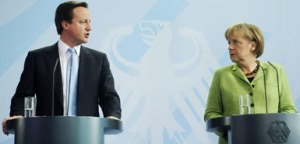David Cameron: No More Power to Brussels
May 21, 2010
Times Online
David Cameron gave a blunt warning to Angela Merkel today that he would veto any attempt to reopen the Lisbon treaty to give the EU more power over national budgets.
EU more power over national budgets.
Standing alongside the German Chancellor, Mr Cameron insisted that he wanted to see a strong single European currency but pledged to block moves to prop it up that involved a transfer of power from Westminster to Brussels.
The Prime Minister held robust and cordial talks with Mrs Merkel in Berlin where they also disagreed over hedge-fund regulation and Mr Cameron refused to reconsider his decision to pull the Conservatives out of the main centre-Right group in Europe.
The two leaders put on a relaxed show for the cameras, with Mrs Merkel’s mood buoyed by securing a “yes” vote in the German Parliament for the eurozone’s 750 billion euro bailout fund, to which Berlin will contribute up to €147 billion in loan guarantees.
But the convivial atmosphere could not mask their differences, with Germany leading calls at a finance ministers’ meeting in Brussels today for EU treaty changes to help restore confidence in the euro by introducing new sanctions and powers of co-ordination.
“There is no question of agreeing to a treaty that transfers power from Westminster to Brussels. That is set out 100 per cent clearly in the coalition agreement,” Mr Cameron said.
“Britain obviously is not in the euro and Britain is not going to be in the euro, and so Britain would not be agreeing to any agreement or treaty that drew us further into supporting the euro area.”
The Prime Minister added: “It goes without saying that any treaty, even one that just applied to the euro area, needs unanimous agreement of all 27 EU states including the UK, which of course has a veto. I think these are very important points to understand.”
His remarks left open the possibility that the 16 eurozone countries could introduce greater control from Brussels that applied just to them.
Mrs Merkel suggested that she had not given up on her desire to re-open the Lisbon treaty but played down its significance today. “There are certain ideas that Germany has tabled where treaty change plays a role. But this is the beginning. It is very early days as yet,” she said.
She added: “I have made it clear that we need to stabilise the euro but at a later stage we will be able to say what we can do and how should we do it.
“And then we will see what the majority will want and the interests of the eurozone.”
Mr Cameron showed that he had not given up trying to persuade Mrs Merkel to relax tough new proposed EU rules for hedge funds driven by Berlin and Paris.
“We do have our concerns because we do not think actually hedge funds were the cause of the problems in our financial markets and in our economies,” Mr Cameron said.
“We accept the need for regulation but it does need to be fair and proportionate.
“We have a particular issue about hedge funds that are based in other countries but have operations within one EU country and whether they would be able to access the so-called passporting system. So we have concerns; it is still being discussed.”
He refused to be drawn into open criticism of Mrs Merkel’s surprise decision this week to ban certain types of risky trading in shares and bonds, which began a slide of confidence in European shares that continued today.
Mr Cameron said: “Obviously we should respect each other’s decisions on these issues.”
“All I would say is this, and I’m sure there would be agreement on this: what matters is are we dealing with the real causes rather than just the symptoms?
“It seems to me that the cause of many of our problems in the European economies is excessive debt, excessive deficits, financial systems that haven’t worked, banking systems that have ground our economies down.
“Those are the problems. We’ve got to tackle the problems and get to the source of the problems and then actually we’ll find the symptoms will be less of a problem.”
Relations between Mr Cameron and Mrs Merkel were soured by the Conservative pull-out from the centre-Right European group over its support for closer political union in Europe.
Mrs Merkel is understood to have told him that she was saddened by the move which saw the Tories ally themselves with right-wing parties from Poland, the Czech Republic and Latvia.
Peter Ramsauer, the German Transport Minister and old Etonian, who forged links with Mr Cameron through their alma mater, said: “I have tried my very utmost best to try to keep things together. I said ‘David, can you imagine the great British Tories can be a partner of people like Topolánek from the Czech Republic? Never, ever.’ Maybe we can bring them together again. There are lingering hopes very far on the horizon.”
